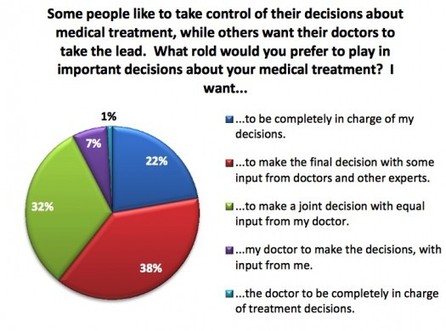Le médicament qui coûtera 1 milliard d’euros à la Sécurité sociale
21/06/2014Smartphone App Measures Respiratory Rate to Help Detect Pneumonia in Children
21/06/2014Why are patients’ using social media for health? |
As we await word from the FDA on final social media guidelines and, before any biopharma organization implements social media we need to understand “why” patients are using social media for health, what THEY want and need and how social media impacts healthcare decision making.
U.S. consumers’ desire to take an active role in their health decisions is growing, according to the Altarum Institute Survey of Consumer Health Care Opinions.
61% of people want to make health decisions either on their own (26%) or with input from their doctor (38%). The proportion of people wanting to be “completely in charge of my decisions” rose 4 percentage points in one year, from 2011. This statistic skews younger, with 33% of people 25-34 and 31% of those 35-44 wanting to be “completely in charge.” Only 17% of those 55-64 felt like being totally in charge of their health care decisions.
Consumer-driven medical spending may be the second-biggest story in health care, after the Affordable Care Act. As employers give workers more ‘skin in the game’ through higher costs from purse and paycheck, the thinking goes, they’ll seek more efficient treatment and hold down overall spending.
A U.S. survey commissioned by Royal Philips Electronics found that consumers believe web-enabled,mHealth and mobile apps are part of their health care solutions and key to living long lives. For example, one in 10 Americans (11 percent) surveyed believe that if it were not for web-based health information, “they might already be dead or severely incapacitated.”
Even with all these facts biopharma organizations still need a more in depth understanding of how consumers are using social media to make healthcare decisions. It has been my experience, for example, that the use and weight of social media varies greatly by disease states. People with MS are looking for information on both new treatments and how to live with MS while patients suffering from depression, maybe more inclined to use social media to better understand depression.
Where does this leave pharma? To find this out, think like a patient and search the Internet for specific questions to health questions. It can be, to say the least, overwhelming. The opportunity for pharma in social media is to think about helping people get the information they need and want rather than thinking of them as “marketing targets”. If we emphasize with our audience and truly want to help them get the best treatment(s) available, we need to think and act as an industry that cares.
Source: worldofdtcmarketing.com



